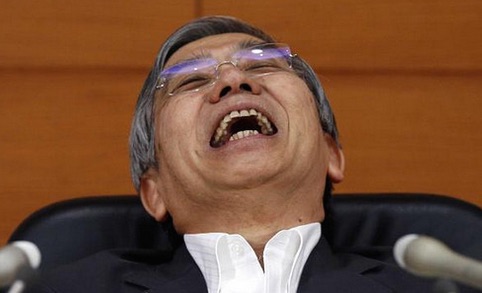You know it’s bad, when …
– QE, End of the Private Sector? Japanese Government Now Largest Shareholder of 474 Big Companies:
The two biggest buyers of Japan Inc. are flying blind and don’t care.
The Bank of Japan and the Government Pension Investment Fund (GPIF) have been buying stocks to inflate the market, create some kind of “wealth effect,” and bamboozle regular Japanese into pouring once again into stocks, after many of them lost a big chunk of their savings when the prior bubble imploded without ever recovering.
In 2014, the GPIF – buckling under the pressure from the Abe administration – decided to plow about 25% (“±9%”) of its assets into Japanese stocks. With assets at the time of still about $1.4 trillion, 25% would amount to about $350 billion. So the fund has been buying a lot! And it has been a disaster! [Read… Japan Mega-Pension Fund Dives into Stocks, Foreign Assets, Loses Shirt. People Not Amused]
But even after Japanese stocks took a licking over the past year, the fund’s allocation to domestic equities is still 21%, so near its range and no longer a powerful buyer. But to make up for any holes left behind by the pension fund, the BOJ announced on July 28 that it would nearly double its annual purchases of equity ETFs to ¥6 trillion ($59 billion).
The holdings of Japanese stocks by these two entities have nearly tripled over the past five fiscal years to about ¥39 trillion ($381 billion), according to The Nikkei. During that time, the Nikkei stock index soared 70%, “demonstrating their powerful support.”
But, but, but… the index remains 57% below its bubble peak of 1989.
So what has this done to overall government ownership of Japanese stocks? We don’t really know, because it’s kept purposefully opaque, according to The Nikkei:
These major public-sector buyers do not appear on shareholder lists because of their indirect ownership via trust banks and other intermediaries.
And yet, The Nikkei figured that “the two together are the largest shareholders for 474 of about 1,970 stocks” on the Tokyo Stock Exchange’s first section (the section for large companies), “based on public information.”
And this is just the beginning.
So for example, between the GPIF and the BOJ, they own 17% of TDK, 16.5% of Advantest, 14.2% of Nitto Denko, 14.2% of Yokogawa Electric, more than 10% of entertainment company Konami Holdings and security services provider Secom.
“We hope they will hold the shares over the long term,” fretted an official of Yokogawa Electric. Because if they ever tried to sell those shares, all heck would break loose.
Overall, the BOJ and the GPIF now hold over 7% of stocks in the first section of the TSE. By contrast the largest private-sector stockholder, Nippon Life Insurance, holds only about 2% of the stocks in the first section.
So hopes are high that the BOJ’s buying binge of ¥6 trillion in equity ETFs, and whatever the GPIF might still buy – though it’s largely finished as a buyer – will inflate the market. Nomura Securities chief strategist Hisao Matsuura thinks that the ¥6 trillion a year from the BOJ alone will inflate the Nikkei index by 2,000 points per year, or about 12%… year after year… come hell or high water, one would assume, because according to this logic, nothing else but central-bank and government-pension-fund buying matters.
If companies have declining sales, losses, and nightmarish management, it wouldn’t matter. These companies would still be able to raise funds and go on as if nothing happened because there will be a relentless and dumb bid, and their stocks would soar since the BOJ and GPIF are passive shareholders, blindly buying equities mostly in form of ETFs. Owners of ETFs cannot dump individual stocks; they cannot punish companies by selling their shares – the most fundamental action of the market.
In other words, the largest most relentless buyers and owners of Japan Inc. are blind, dumb, and mute. That might suit Japan Inc. just fine. Entrenched management coddled by these big passive investors has nothing to worry about. Forget the discipline of the market, or price discovery, or pressures on corporate governance, or any other function of the market. They will all disappear – if they haven’t already.
In this scenario, companies can turn into zombies while the BOJ and the GPIF will still be loading up on ETFs that contain these shares and keep their prices high. And keeping prices artificially high is the only goal of all this buying.
Neither the BOJ nor the GPIF could ever unload these ETFs without unwinding the stock price inflation their relentless and blind buying has caused. And in turn, if the BOJ and the GPIF start selling their ETFs, even high-performing companies would see their share prices get eviscerated.
With these two public elephants in the room, nothing else matters. And this has some ironic consequences, according to Shingo Ide, chief equity strategist at NLI Research Institute: “Regular investors who focus on company analyses may hesitate to buy.” And that may have something to do with the swoon of Japanese stocks over the past 12 months.
But the BOJ is already fretting about the next crash and is building up a big pile of dry powder. Read… Bank of Japan Prepares for Crash Triggered by Fed Tightening
* * *
PayPal: Donate in USD
PayPal: Donate in EUR
PayPal: Donate in GBP
